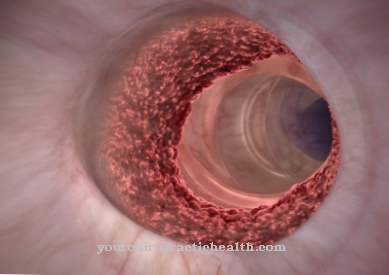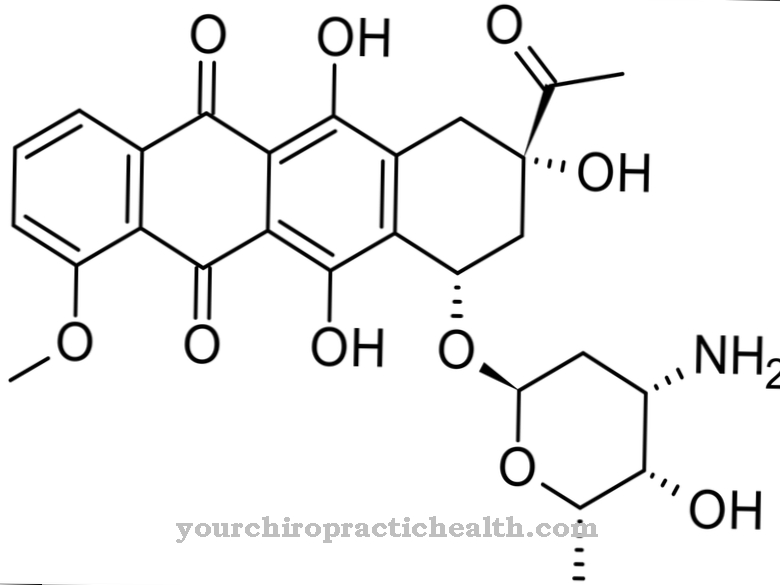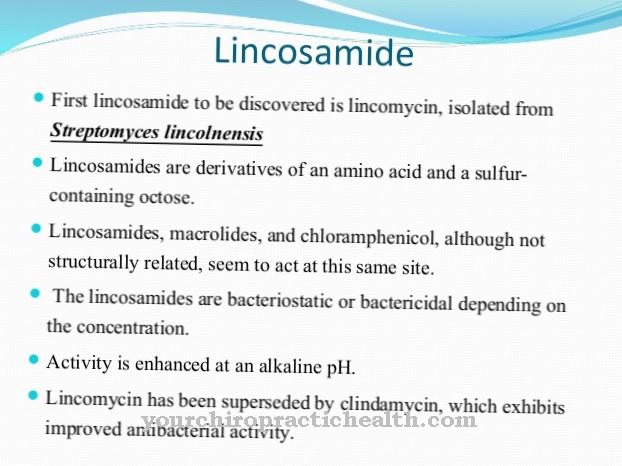The active substance Amisulpride is a benzamide and sulpiride derivative. It is sold under several names and is used as an atypical neuroleptic for schizophrenia therapy. Amisulpride requires a prescription.
What is amisulpride?

The full chemical name for amisulpride is (RS) -4-amino-N - [(1-ethyl-2-pyrrolidinyl) methyl] -5- (ethylsulfonyl) -2-methoxybenzamide. Amisulpride is a dopamine receptor antagonist and is used as a so-called racemate for the therapy of acute and chronic schizophrenia. In individual cases, therapeutic success in Tourette's syndrome has also been observed. Amisulpride is available as tablets of 50 mg, 100 mg, 200 mg and 400 mg and as a 1 ml oral solution with 100 mg of the active ingredient. The attending physician decides the dosage form and dose.
The neuroleptic amisulpride has an antipsychic and sedative effect. Unlike most neuroleptics, benzides such as amisulpride do not have a dampening effect, but rather mood-enhancing and activating. The use of amisulpride causes fewer side effects than usual neuroleptics. In particular, phenomena such as movement disorders or fatigue occur much less frequently.
Pharmacological effect
Chemically, amisulpride belongs to the group of substituted benzamides and it is a derivative of sulpiride. Neuroleptics intervene in the nervous activity of the brain by changing the concentration of messenger substances in the brain. This influences perception and emotional life.
While most of the typical neuroleptics act on the messenger substance dopamine and thus on the corresponding receptors, amisulpride, as an atypical neuroleptic, also has an inhibitory effect on other messenger substances and their binding sites in the brain. This also includes serotonin.
As a drug against psychoses such as schizophrenia, the atypical neuroleptic amisulpride has a twofold effect:
- 1. Amisulpride influences the "positive symptoms": It cushions delusions.
- 2. Amisulpride also influences the "negative symptoms": It reduces effects such as social withdrawal, isolation, reduced drive and a flattening of the patient's feelings.
- Amisulpride has an increased mood-enhancing and activating effect and is not tiring and dampening like typical neuroleptics.
The active ingredient amisulpride can interact with other centrally acting drugs and increase their effects. Amisulpride has the opposite effect and weakens its effect on levodopa, an anti-Parkinsonian drug. Occasionally, during therapy with amisulpride, an additional administration of an anti-Parkinsonian drug is recommended in order to relieve side effects such as impaired motor skills, body stiffness or cramps.
Other possible side effects of amisulpride are: Tardive dyskinesia, hyperprolactinemia, menstrual disorders, impotence, loss of libido, gastrointestinal complaints, epileptic seizures, hypotension and the prolongation of the QT interval of the heart. Extrapyramidal motor side effects are rare during treatment with amisulpride compared to other neuroleptics.
Medical application & use
As an atypical neuroleptic, amisulpride is used to treat schizophrenia and other psychoses. These are in detail:
- Schizophrenia - Acute and Chronic
- Psychoses, delusions, thought disorders, hallucinations
- Personality disorders
As a non-dampening drug that lifts and activates mood, amisulpride has a positive effect on forms of behavior such as social distrust and hostility - especially towards strangers, social withdrawal, impoverished or flattened emotional life and lack of drive.
Under therapy with amisulpride, severely lethargic patients have so far managed to free themselves from their self-chosen isolation due to a lack of drive by approaching other people with interest.
Despite an indication for acute schizophrenia, amisulpride only has limited potential here.
You can find your medication here
➔ Medicines to calm down and strengthen nervesRisks & side effects
In certain cases amisulpride is contraindicated - namely in:
- Parkinson's disease, as it counteracts the drug Lepodova
- Alcohol abuse
- severely impaired kidney function
- Allergy to the active ingredient amisulpride
- Combination with drugs that can cause serious heart rhythm problems
It should also be noted that amisulpride can increase the effects of other psychotropic drugs.
Children and adolescents under 15 years of age are excluded from amisulpride prescription. It is also not recommended for ages 15 to 18 and over 65 years of age. Amisulpride should not be taken during pregnancy and breastfeeding; if necessary, breastfeeding should be stopped for such a long time.
Since amisulpride can lead to a malignant neurological syndrome, as with other neuroleptics, if symptoms such as muscle stiffness, high fever, vegetative disorders (paleness, sweating and circulatory instability) and impaired consciousness occur, a doctor should be contacted immediately and the drug should be discontinued.



























